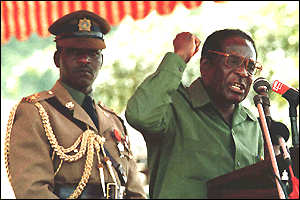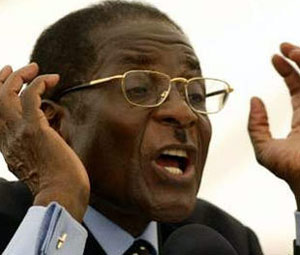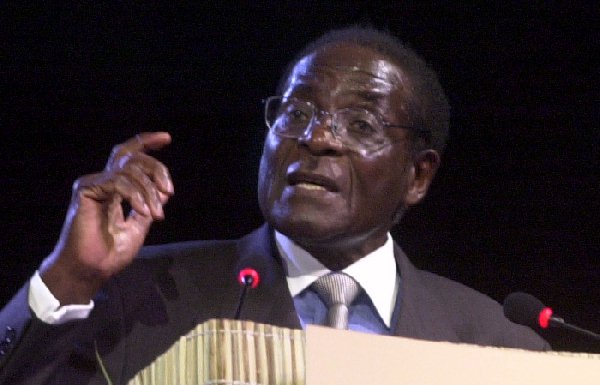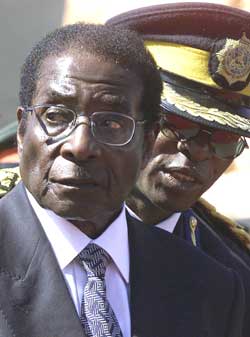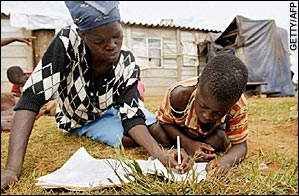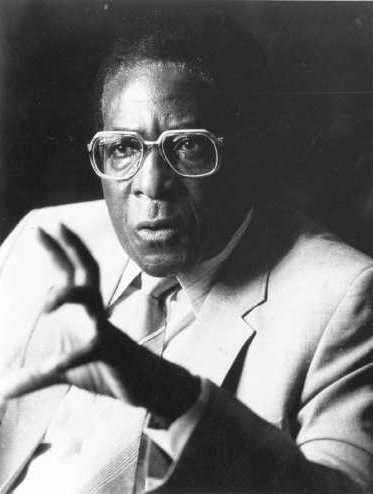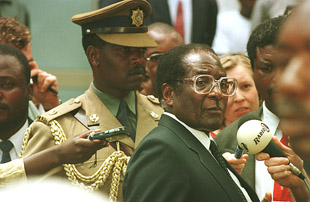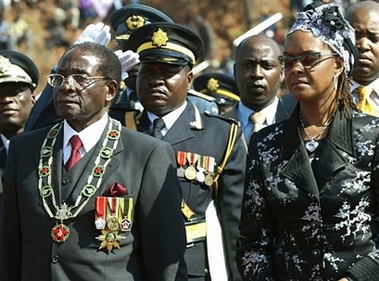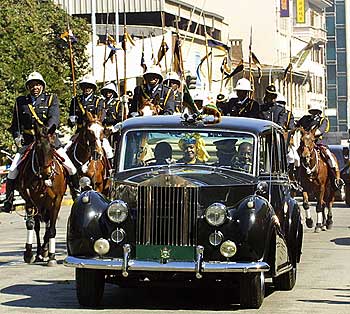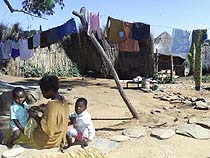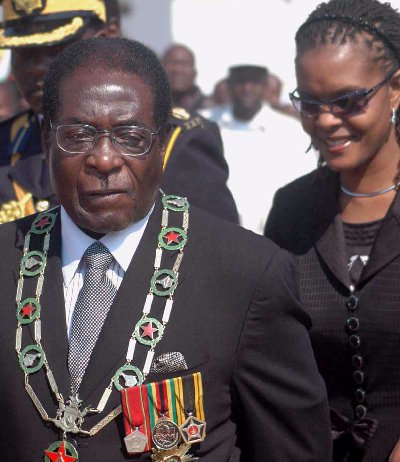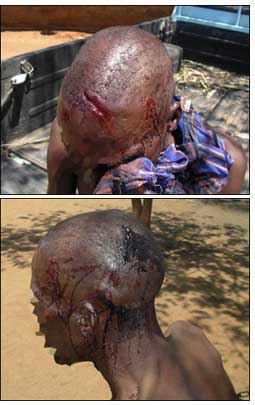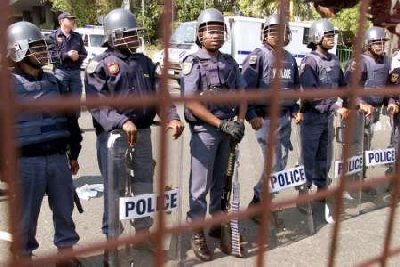|
|
|||||||||||||||||||||||||||||||
|
Robert Mugabe: Zimbabwe's Dictator for Life?
Getting rid of Mugabe
In more than a quarter of a century in power, Robert Mugabe has turned one of Africa's most promising countries into a basket case. As Peta Thornycroft reports today from Harare, inflation has reached such a pitch that a school teacher cannot afford the bus fare to and from work. The black middle class has fled – the Reserve Bank estimates that one million of them might be in Britain – and those Zimbabweans who remain are witnessing the disintegration of public services, from hospitals to water-treatment plants and power stations. Yet Mr Mugabe remains in power, calculating that the privileges afforded the top echelons of the security forces and the ruling party, Zanu-PF, will not only keep him there until his term ends next year but, through a constitutional amendment, could extend his rule to 2010.
Over the past seven years of accelerating political oppression and economic decline, it has become clear that the deus ex machina will not come from abroad. Britain, the former metropolitan power, fears being accused of neo-colonialism. South Africa, which could apply powerful leverage, disguises its revolutionary sympathy with Mr Mugabe by proclaiming the (illusory) benefits of "quiet diplomacy". Saddest of all, the domestic opposition Movement for Democratic Change has been weakened by factional division. If, then, the president is to be removed before 2010, it is more likely to be through a palace coup than foreign intervention or electoral defeat. The most obvious instigator is Emmerson Mnangagwa, a veteran guerrilla fighter and brutal former security minister who has fallen out with the president and opposes plans to extend his term beyond 2008. The catalyst for a coup would be his uniting disaffected elements of Zanu-PF and mid-ranking members of the security forces. Given Mr Mnangagwa's fearsome record, the result would hardly be sweetness and light. But it would at least promise less crazy economic management than that offered by the octogenarian ogre who currently occupies State House.
Zimbabwe: Mugabe 2010 Plan in Tatters
PRESIDENT Robert Mugabe's plan to extend his term of office which expires in March next year by another two years to 2010 is in tatters after the Zanu PF politburo failed to endorse it last week. Resolutions in the politburo are carried by acclamation and the discord of the Goromonzi conference was manifest at last week's meeting, participants said. Consensus is important to avoid dissent in parliament when constitutional amendments are tabled to facilitate the plan. Inside sources said this week the politburo, the ruling party's supreme decision-making body, baulked at approving the plan, which triggered an unprecedented internal revolt at the party's ill-fated conference in Goromonzi in December last year. This put Mugabe's plans in disarray. As first reported by the Zimbabwe Independent in December, Mugabe wants to move from being executive president to a ceremonial head of state, elected by the current Zanu PF-dominated two houses of parliament in a joint sitting as an electoral college, after March 2008. After this he would then appoint a prime minister from the majority party in parliament -- which is Zanu PF in this case -- to form and lead either a Zanu PF government or a government of national unity. The preferred position, in terms of the plan, is to appoint a government of national unity to rally round the new prime minister -- possibly Reserve Bank governor Gideon Gono -- to work without partisan problems intruding.
Mugabe, who probably wants to remain as the Zanu PF leader after its 2009 congress, would be a ceremonial head of state on paper while in practice continuing to govern as a de facto executive president. This is said to be part of his strategy to secure immunity from possible prosecution for his excesses in power. Depending on events, Mugabe would leave in 2010, but party insiders say he has resolved to become life president. Last year Mugabe repeated his self-serving argument that he won't quit because his party would disintegrate. Delegates to the Goromonzi watershed conference refused to endorse his 2010 election proposal which had purportedly been backed by eight Zanu PF provinces and the committee on the state of the party at the meeting.
Harare and Mashonaland East have up to now refused to support the plan. Sensing an open rebellion over the conflict-ridden issue during the conference, the Zanu PF leadership took the safe way out. They suspended the process of making final resolutions, claiming there was no more time to do it. Party leaders then tried to mislead their supporters saying the delegates had upheld the election initiative, although they also admitted the plan had to be referred back to provinces. Before last week's politburo, which was the party's first meeting in 2007 after the Goromonzi conference, Zanu PF spokesman Nathan Shamuyarira claimed the party was meeting to endorse resolutions of that conference. However, after that meeting he said the election harmonisation initiative had been referred back to provinces for further consultations, showing the politburo was still divided over it and had not made any headway. This effectively means Zanu PF has now gone back to the drawing board to restart the unpopular process. Shamuyarira and Zanu PF national commissar Elliot Manyika are spearheading the campaign. Their other brief is to re-organise the provinces to make them amenable to the 2010 plan. They however face continued resistance in Harare and Mashonaland East where senior party officials have refused to endorse Mugabe's extended tenure. Sources said Manyika last year shocked members of the conference committee on the state of the party when he, as the committee chair, demanded they had to first pledge loyalty to Mugabe before debate on the issue. Committee members refused and told him to "stop being ridiculous", a source said. After discussions, committee members said they supported the idea of the need to hold the elections simultaneously, but not necessarily in 2010. They asked why 2010 and not 2008 because they thought it was a Machiavellian way of trying to extend Mugabe's tenure, the sources said. After the politburo meeting last week, it was agreed that the party's central committee would meet next month to deal with the problematic issue again. The politburo first approved the issue amid firm resistance in December. But the central committee nodded it through because it was supported mainly by the Women's League members who appeared choreographed in their statements. The central committee is likely to endorse it again in March. However, Zanu PF MPs are mobilising to block the plan in parliament where only 10 ruling party legislators -- already there in the form of Mashonaland East MPs -- need to vote with the opposition MDC to defeat it.
Zimbabwe on the brink of total collapse
The collapse of Zimbabwe's economy has finally taken its toll on President Robert Mugabe's regime. It is facing a disintegrating army and police, a wave of strikes, power black-outs and the breakdown of every essential service. With inflation running at 1,281 per cent – the highest rate in the world — Mr Mugabe finds himself locked in a vicious circle. It takes only a few weeks for the value of every pay rise given to civil servants to be wiped out. But the bankrupt regime can only cover the cost of further wage rises by printing money – which fuels inflation still further and creates pressure for yet more pay increases. Tension on the streets of the capital, Harare, was mounting yesterday as people scavenged to earn extra money for food and transport. Some of those fortunate enough to have jobs cannot even afford bus fares. In what was once one of Africa's most prosperous economies, a 35-year-old primary school teacher with six years' service earns £13 a month. The woman, who wished to remain anonymous, said: "My take-home pay is not enough for transport to work, so I am not going to school this week." She is not on strike, although many of the 110,000 state teachers started a "go slow" this week and are absent from classrooms. This has left parents to fill in as home-teachers.
Zimbabwe's four largest hospitals are crippled by a seven-week strike among junior doctors, who earn only £6 a month after deductions. All civil servants received a 300 per cent pay rise in January – but inflation has already eroded this gain. Cholera has broken out in Harare because the water treatment plants are collapsing. Power black-outs are increasing and one town, Chitungwiza, gets only four days of electricity a week. Mr Mugabe responded by saying that any protests "will not be tolerated". But he relies on the army and police to suppress challenges. Sources in the army say that soldiers – while far better paid than teachers or nurses – are still enduring "desperate" conditions. Most of those below the rank of colonel earn less than $1 [51p] per day – the international measure for absolute poverty. "There is plenty of indiscipline because we are hungry," said one captain. Mr Mugabe's elite Presidential Guard, which has extra perks and higher salaries, is also disgruntled, according to the military source.
But the economic collapse has created opportunities for the corrupt elite around Mr Mugabe, who have already benefited from the seizure of white-owned farms. Senior figures in the ruling Zanu-PF party can buy US dollars from the Reserve Bank at the meaningless official exchange rate – and then sell them on the parallel market at a 2,000 per cent profit. They can buy fuel from the state at one twelfth of the market price. This gives a powerful core of Zanu-PF figures a vested interest in keeping Mr Mugabe in power. The president, who turns 83 later this month, gambles that by keeping this wealthy handful happy, he can survive the economic collapse and extend his 27-year rule. Splits in the opposition Movement for Democratic Change have made Mr Mugabe's task easier. But continuing this balancing act indefinitely may not be possible, especially if discontent spreads in the vitally important army and police force. "I have never seen a crisis of this depth before," said John Robertson, an independent economist in Harare. "There seems to be no solution in sight." Daniel Ndlela, another economist, said: "This is an unsaveable situation. It is by far the worst since independence. "It will collapse, as the government will talk a lot but it won't change its ways. When and how this collapse will happen, that is the question."
Zimbabwe: Let's Reject Mugabe's Ploy to Rule Forever
NOW that the Zimbabwean crisis has undeniably reached its tipping point with catastrophic failure looming on the horizon as everything for everyone everywhere across the country begins to rot or collapse beyond repair, it is alarming to observe that President Robert Mugabe remains doggedly in hot pursuit of a reckless three-pronged strategy to keep himself in power beyond 2008 without having to face the electorate ever again. The components of this creepy strategy are the reshuffled deadwood cabinet announced this week, the impossible social contract proposed last week by the governor of the Reserve Bank and the sinister proposal to harmonise presidential and parliamentary elections in 2010 under the laughable pretext of cutting administrative costs. Mugabe's latest futile attempt to impose a sinister extension of his now unwanted rule came last week on Wednesday at the first meeting in 2007 of the Zanu PF politburo. While the meeting reaffirmed the Goromonzi position that the 2010 proposal should be sent back to the ruling party's provincial structures where it faces certain death, the fact that Mugabe continues to single-mindedly push for the widely unpopular proposal poses a dangerous threat to national security, political stability and economic recovery efforts given that he is now a dangerous dying horse whose last kicks could be fatal to the nation if left unchecked. Ironically, or was it by some kind of fateful coincidence, it was on the same Wednesday of the politburo meeting last week when Reserve Bank governor Gideon Gono presented his landmark monetary policy statement that effectively acknowledged failure as the only option under Mugabe's Zanu PF rule while also proposing as the way forward a non-starter in the form of a "social contract" between a discredited, aloof and dysfunctional Zanu PF government led by an unwanted president, a battered and embittered business community that has grind to a halt and a disempowered and poverty stricken labour force that is now praying for God's intervention. Make no mistake about it, world history does not have even one example of an embattled country with such mutually antagonistic would-be partners who are breeds apart in every respect ever entering into a social contract let alone a successful one. A necessary precondition for a viable social contract around the world is a functional and capable constitutional government that enjoys national and international goodwill.
That kind of government is precisely what Zimbabwe does not have today and cannot hope to have under Mugabe who this week demonstrated beyond doubt that he has come to the end of the road when he announced a practically useless reshuffled cabinet packed with deadwood and thus not fit for the purpose. For example, Samuel Mumbengegwi is a jolly good fellow to those who know him but he cannot and will not be taken seriously as Minister of Finance, particularly in these trying and tragic times of economic turmoil. His appointment engenders economic doom and spreads political despair when it should be inspiring all-round confidence. As things now stand Mugabe's officialdom is offering suffering Zimbabweans a self-serving strategy with three mutually supportive but unworkable deals as the solution to the unprecedented economic meltdown, political decay and institutional collapse gripping the country:
There is no deal here. Zimbabwe urgently needs a new competent government with national and international goodwill under a new leader, not a reshuffled cabinet led by a failed and discredited sunset president who wants to cling onto power through mendacious means when he should be leaving office.
Regarding the 2010 proposal, it should be obvious to anyone who cares to think honestly about the sad state of our country today that the plan to harmonise presidential and parliamentary elections merely as a cover for extending Mugabe's term by at least two years from 2008 -- outside a popular election and outside a comprehensive package of constitutional reforms -- is tantamount to adding fuel to the already raging fires of instability across the country. In the same vein, the proposal for a social contract, however well meant or intended, is frankly wholly misplaced under these troubling national circumstances and is akin to burying one's head in the sand and hoping for the best while there is nothing better or good to justify that hope.
The time has come for Zimbabweans in crucial national positions in government and related state institutions and within Zanu PF itself to realise and acknowledge without fear or favour that the problem is manifestly Mugabe, stupid. Given the rot in and collapse of all things big and small in our country, Zimbabweans -- especially those in Zanu PF, government and related public institutions -- now have an inescapable duty to make a clear and historic choice without prejudice whether to put Mugabe first or Zimbabwe first. This means that everyone regardless of their station in life or political affiliation must stand up to Mugabe's triple strategy. In order to do that well, it is important to understand that what Mugabe wants to achieve through his triple strategy of harmonising presidential and parliamentary elections in 2010, his reshuffled deadwood-cabinet and the social contract proposed by the Reserve Bank of Zimbabwe is to circumvent popular elections by subverting the constitution for personal purposes of remaining life president. Mugabe wants to achieve this by any means necessary or available to him with or without executive powers in order to continue enjoying the immunity of his office as an incumbent. He simply does not want to become a living former president with weakened immunity liable to prosecution by his successor or anybody else in or outside Zimbabwe with a human rights bone to chew with him. In particular Mugabe is hoping to use the 2010 plan, supported by his new deadwood-cabinet and the proposed social contract, to move as early as March 2008 from executive president to a ceremonial non-executive president elected by the two houses of parliament sitting together as an electoral college. Under this sinister scheme which Mugabe's propagandists have poorly presented as a "dignified exit" they say is different from the feared "political consolidation", Mugabe would appoint a prime minister from the majority party in parliament who in theory would form and lead either a Zanu PF government or a government of national unity depending on who would be prime minister.
There are two major problems with this among many other worrying considerations. In the first place, the plan is not part of a wide ranging constitutional reform package which Zimbabwe needs. It is all and only about Mugabe's immunity needs as an individual. If Gono's proposed social contract was anchored in broad-based constitutional reforms, then there would be something important to talk about and support because that is what the country needs. In the second place, the plan views Mugabe's proposed movement from executive president with ominous powers to a ceremonial president presumably but not certainly without executive powers as a "dignified exit". Yet this movement would in fact neither be an exit nor dignified. How can Mugabe's proposed movement, as head of state retaining the title of president, from one highest office to another be an exit when it is clearly a sinister re-entry through the backdoor? A backdoor re-entry into power without the democratic mandate of the people through the polls is by definition not dignified.
One does not need to be a rocket scientist to realise that, because he would have had unchallenged executive powers for over 27 years and because he would still be president of the ruling Zanu PF, Mugabe could in March 2008 become a ceremonial non-executive president in de jure terms under the 2010 plan while remaining the de facto executive president. This would be necessitated by accumulated power and political realties within Zanu PF, the military and security organs of the state whose superiors remain solidly behind Mugabe. In any case, it would be very odd and totally unacceptable to have Mugabe as a ceremonial non-executive president while he is also the president of Zanu PF who presides over the Zanu PF central committee and politburo which are said to be superior to the cabinet and therefore above government. A ceremonial, non-executive president must necessarily be above active party politics as head of state. As such, it is imperative that Zimbabweans from across the political divide should do everything they can to reject Mugabe's triple strategy of seeking to remain president for life outside the electoral process for personal reasons of protecting his immunity to the detriment of the national interest.
|
|
||||||||||||||||||||||||||||||
|
Website Design + SEO by designSEO.ca ~ Owned + Edited by Suzanne MacNevin | |||||||||||||||||||||||||||||||
